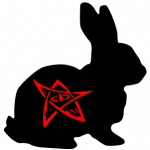
Writing Lovecraftian-styled fiction for the sake of your entertainment (not to be confused with my sanity), both in style and theme, has occurred in threes for me this year. The first story, titled “The Dig,” will be published in an upcoming issue of the Lovecraft eZine. I just sent in a final revision for the second story, titled “The Button,” which will be published as part of the Kickstarter “We Are Dust” anthology. The third story, for this Kickstarter anthology by Chaosium Publishing, is loosely titled “The Women Who Called Down The Train.” The latter is in the nascent stages of storytelling, if only because I have a particular niggly bit that needs to make sense for the continuity of the tale, and because that’s a story that’ll need a beta reader or two prior to sending.
The first story I wrote with a gender neutral character in mind. It’s first person, yes, but I don’t make it a point to call out the protagonist as male or female. The second, which I just finished, was also penned in first person splashed with a few doses of second here or there for mad, mad fun. That story, however, has a decidedly female protagonist and was written in an even more “purist” Lovecraftian style than the first. I haven’t decided quite how the third will be presented, though if I construct the story like I would a Lego City, then it may be experimentally structured. Again, I haven’t gotten to that point. Right now, I’m just having a blast with the concept.
Does it matter to me whether Lovecraft himself was a feminist? No. What I am concerned about, is how I interpret his work, both as an author and as a reader, and that his work has had a profound impact on the horror genre. (In point of fact, finding out very famous authors are less than desirable people is a little like meeting a celebrity you admire greatly, only to find out that person likes to kick puppies and relies on their PR people to buff up their “nice guy” image.) Of course, the author as a person is often inexorably linked to author’s intent, but it always (has to) come back to the Work for me.
I absolutely feel that author’s intent matters to get a deeper understanding of any story, provided the author stands up and says something about it, which many don’t. (More, I suppose, do now with the need to blog about one’s pile o’ words.) However, while author’s intent matters to some degree, it’s often open to interpretation once the story is published for human consumption. The reader will take whatever they want from a tale and run with it, much like an author will put their spin on a particular story and claim it for their very own. (The author having no control over that whatsoever.) This is why bad reviews of books everyone else agrees are “good” happen. A story, regardless of when it was written or who it was for, is always judged by the reader.
But I digress. If it wasn’t clear before, I am not a misogynist myself. Not merely because I don’t lack the equipment to be one, mind you, but because I do happen to like, love, trust, and treat myself and other women well, the same way I would a man, generally speaking. Even if I did have equipment related to the male persuasion, I know myself well enough to understand my fundamental beliefs, some of which were earned rather painfully through experience, and they would not change. To me, it’s more than a little illogical (nigh, stoopit) to paint an entire portion of the human race as awful, terrible, human beings without actually getting to know them. (Key phrase here: “getting to know them.” And YES, that means face-to-face and not only online, too!) Would an entire barrel of apples be ruined by the one? Well, old wives have asked this question before and surely know the answer better than I do.
To sum up so far, we have Lovecraft potentially misogynist as an author, fairly misogynistic stories based on my own interpretation as a reader, I am not a misogynist, and finally, I’ve aped his style to pen a story clearly classified as “Lovecraftian” that plays around with the idea of misogyny.
I am, in part, writing this post because sometimes we are so wrapped up in the facts that we forget that books require a relationship between the writer (In this case, someone who lived decades ago.) and the reader. I am not telling you what to think or how to interpret Lovecraft because that would be extraordinarily presumptuous of me. People can have similar relationships with stories, sure, but not everyone likes the same thing, understands the same nuances, or feels the same emotional response to a story. It’s uniquely personal.
Here’s the first question I posit in this sanity-stealing exchange, though I’m sure you have many, as this post is rife with opinions tossed about the same way I use garlic. Um. . . I use a lot of garlic.
Is it possible to write in a style reminiscent of Lovecraft using protagonists Lovecraft himself would never consider and still be classified as “Lovecraftian”?
Yes.
Why?
Because women are afraid of Cthulhu, too. It does humanity a great disservice to avoid exploring the Arte of Story from other characters’s viewpoints be they fat/thin, young/old, able/not, male/female/transgendered/asexual, gay/straight/bi, [insert culture of your choice here], Dungeons and Dragons/Pathfinder, coffee/tea, etc. etc. etc. Do you honestly think that the male gender is the only sex capable of acting as lead characters in Lovecraft’s worlds? Of losing their minds? Of experiencing the deepest levels of fear? Ah, but here popular interpretation tells us so. (Never mind what he was like in real life; I am concerned with the stories themselves for the purposes of this post, mind you.) For Lovecraft’s main characters were decidedly male and, when women did appear? They were “the bad guys.” (Though, there was The Thing on the Doorstep.)
Wait, are you saying that modern-day writers can tell a Lovecraftian story with a female protagonist?
Yes, yes I am. Many other authors have already, and there are more to come I’m sure. I’ve written one so far, and I plan to write more of them if fancy and money strikes me. As a satirical piece, I also wrote a story where a ritual goes wrong and Nyarlathotep winds up in the body of a bunny rabbit, only to be defeated by a small girl who called him “Queenie.” :p
But, BUT! *head asplodes*
Easy there. Yes, I am saying that if a celebrated story or author purports values or themes I don’t personally agree with, I don’t feel obligated to love those stories/authors or regurgitate the same style they were originally created in, too. That, my friends, is the beauty of choice both in reading and writing. However, if someone is deemed valuable in some fashion or another, I would be an idiot if I didn’t read their work. Why wouldn’t I? Their stories are no threat to my craft. In order for me to write, I have to read deep and broad, much like I have to have a cup of coffee when I wake up or I’ll likely slaughter all my characters by noon.
You’re not a true Lovecraft fan!
OBVIOUSLY, I find other elements in Lovecraftian fiction that are quite brilliant! I interpret those nuggets depending upon whatever my story requires and, as I’ve come to discover, my frame of mind.
Feminism (in the context of promoting equality of men and women, which is just silly that we’re still fighting for this in an era where I can communicate instantaneously with someone in China and we’ve landed on Mars) has been on my mind due to recent political stupidity. I’m not sorry for ranting about this, either, for I’m a little tired of arguments legislating my parts when it’s never about the male bits. It’s always about the female’s as if babies just spontaneously pop into being of their own accord. Oh, now that’s a frightening thought. I surely hope our education in the sciences hasn’t been that lacking.
Mind you, and I want to be extraordinarily clear as I possibly can be — I didn’t write the story to prove a political point or alienate red or blue. I am not eighteen anymore. I do not write things solely for myself and when I do those go into my Morgue. (Mostly, bits of bad poetry which are a lot of fun to play around with, and I sometimes share them here.) Inspiration is very different from, well. . .writing an urban fantasy book like The Fountainhead for example. That’s not something you’ll find me doing, to be sure.
Where were we. Ah, yes. So, to conclude this screed, books are not one-sided. Because of that, a writer will always take something from the work and interpret it as their own, either consciously or unconsciously, in service of the story. A reader, on the other hand, will also get something unique from that tale which was why the story was written in the first place.
Lovecraft is only one example of an author who has a reputation for not painting a portion of humanity in an excellent light; I take that as an opportunity to infuse diversity into a primarily Anglo-saxon-fish-man-leaning body of literature. (Note: the last generality was used for the purposes of sarcasm and I, in no way shape or form, claim to be an expert on all things Lovecraft nor am I casting the Curse of Well, Actually! I ask you respect said same.)
It is my job, as storyteller, to write the best story possible and reveal to you the truth of life, the universe, and everything as I see it — even if it’s on a subconscious level. It is your job, as a reader, to decide whether or not that happened.
Hopefully, we will meet one day, and you can tell me all about it.
[ Cue evil laughter. ]
Mood: I laugh in the face of danger.
Caffeinated Beverages Consumed: Calculating caffeine milligrams with respect to word count in 3…2…1…
Work-Out Minutes Logged Yesterday: I did my pilots! Oh, wait. That’s pilates.
In My Ears: Your screams. Ahhhhhhhhh!!!!!!!!!!!!!!!!
Game Last Played: Star Wars Legos
Movie Last Viewed: The Raven
Latest Artistic Project: In progress!
Latest Release: “Fangs and Formaldehyde” from the New Hero anthology through Stone Skin Press




